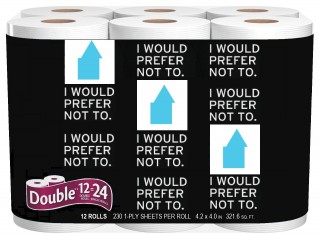December 8, 2014
Amazon gets into the diaper business; Melville House gets into the toilet paper business
by Mark Krotov
Last week, Amazon unveiled its own line of diapers called Amazon Elements, which, according to Time, “sets the online retailer up as a competitor with its suppliers,” and according to Re/code is “a shot across the bow at the big diaper brands, Huggies and Pampers, that sell their products on Amazon.”
To which we say: great news!
For too long, we at MobyLives have seen Amazon as a foe. But no more. Because today it’s time to admit that we were wrong, and Amazon was right. Indeed, Amazon has always been right.
What made us change our mind? Diapers.
Yes, the company’s latest extraordinary move has recast it, in our eyes, from an enormous threat to culture to a glorious innovator in pursuit of truth and wisdom. A corporation that we once saw as a beneficiary of weak regulation and a ruthless exploiter of labor now looks, through diaper-colored glasses, very different indeed.
For a retailer to expand into the diaper business makes profound economic sense—we know this. Just think of David Ricardo’s classic Essay on the Influence of a Low Price of Defecatory Undergarments on the Profits of Stock (1815), or Milton Friedman’s groundbreaking Disposable or Cloth: The Current Diaper Problem (1956).
But Amazon’s absorbent, sodium polyacrylate-containing underwear is something more than a sound piece of corporate reasoning. It is an inspiration. So what if a pivot to a new diapercentric strategy provokes angry responses from the manufacturers on whose products Amazon depends in the first place? And so what if, like many failed initiatives before it, Amazon Elements will turn out to be a disaster, leaving behind a wave of bad PR, disappointed customers, and decimated suppliers? Like laws and taxes, these are silly, irrelevant concerns, especially when weighed against the productive capacity of such an exciting new idea—a new idea from which will blossom a thousand other new ideas. And no new idea is newer or idealer than . . .
Bartleby: the brand-new toilet paper from Melville House Publishing
Inspired by Amazon’s heroic colonization of the paper products-that-come-into-regular-contact-with-human-asses (or PPTCIRCWHA) sector, Melville House is launching our very own brand of toilet paper. For the first time in the company’s thirteen-year history, we are venturing beyond the printed word into paper free of words of any kind.
Why toilet paper? Because as Amazon has shown, if you were once a reasonable alternative to one thing, then you are clearly equipped to do everything! So why devote our efforts merely to the publication and promotion of exceptional, exciting, unusual, and award-winning books when there are so many realms starving without our intervention and disruption? And no realm is more desperate for reform, more hungry for progress, more in need of vertical integration than the PPTCIRCWHA sector.
Enter Bartleby. It’s everything you’ve come to love about Melville House—but in toilet paper form.
Think back to your first encounter with a Melville House book. Surely you could tell right away that the book you were reading was different from all other books—its literary ambition was grander, its satire more stinging, its analysis more substantive. In collaboration with our printers, sales representatives, and even a handful of loyal customers, we have developed a toilet paper that embodies entirely the Melville House ethos. Bartleby is:
- fiercely independent: your other, conformist toilet paper will develop an inferiority complex
- artisanally sourced: this isn’t your run-of-the-mill, corporate product. It’s made well, and it’s made in America
- rigorously edited: you won’t find an imperfect square or a flawed perforation anywhere
- carefully promoted: we know it’s not for everyone, but we’ll work hard to get it into the right hands
- politically engaged: this toilet paper won’t shy away from the issues of the day—it’ll make news
Most of all, Bartleby is, for Melville House, a tribute to a new way of doing business. Why work hard at being the best at one thing, when you can attempt to colonize a growing number of markets, no matter the illegality of the means or the quality of the execution? That’s the Amazon lesson, and it’s a lesson we’ve absorbed completely and enthusiastically.
So next time you’re deciding which brand can best suit your toilet paper needs, think of us. And think of Amazon, whose quest for innovation has led it straight into the sewer.
Mark Krotov is senior editor at Melville House.
